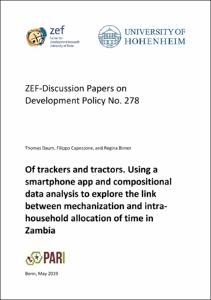Daum, Thomas; Capezzone, Filippo; Birner, Regina: Of Trackers and Tractors. Using a Smartphone App and Compositional Data Analysis to Explore the Link Between Mechanization and Intra-Household Allocation of Time in Zambia. Bonn: Center for Development Research (ZEF), 2019. In: ZEF Discussion Papers on Development Policy, No. 278.
Online-Ausgabe in bonndoc: https://hdl.handle.net/20.500.11811/9756
Online-Ausgabe in bonndoc: https://hdl.handle.net/20.500.11811/9756
@techreport{handle:20.500.11811/9756,
author = {{Thomas Daum} and {Filippo Capezzone} and {Regina Birner}},
title = {Of Trackers and Tractors. Using a Smartphone App and Compositional Data Analysis to Explore the Link Between Mechanization and Intra-Household Allocation of Time in Zambia},
publisher = {Center for Development Research (ZEF)},
year = 2019,
month = may,
series = {ZEF Discussion Papers on Development Policy},
volume = No. 278,
note = {Digital tools may help to study socioeconomic aspects of agricultural development that are difficult to measure such as the effects of new technologies, policies and practices on the intra-household allocation of time. As new technologies, policies and practices may target different crops and tasks, they can affect time-use of men, women, boys and girls differently. Development strategies that overlook such effects can fail or have negative consequences for vulnerable household members. In this paper, the effects of agricultural mechanization on time-use in smallholder farming households in Zambia were investigated. For this, a novel data collection method was used: a pictorial smartphone application that allows real-time recording of time-use to eliminate recall bias. Existing studies analyzing intra-household allocation of resources often focus on adult males and females. This study paid particular attention to boys and girls. The study also addressed seasonal variations. For data analysis, compositional data analysis was used, which yields higher accuracy than univariate analysis by accounting for the co-dependence and sum constraint of time-use data. The study found that women benefit relatively more from mechanization with regard to time-use during land preparation, which leads to gender differentiation; for households using manual labor, such differentiation was not found. There was some evidence that the time "saved" is used for off-farm and domestic work. No negative second-round effects (such as higher labor burdens) during weeding and harvesting/processing and no negative effects on children were found. The study debunks some myths related to gender roles in African smallholder agriculture, opens the field to more studies on technology adoption and time-use and suggests that gender roles are changing with agricultural transformation.},
url = {https://hdl.handle.net/20.500.11811/9756}
}
author = {{Thomas Daum} and {Filippo Capezzone} and {Regina Birner}},
title = {Of Trackers and Tractors. Using a Smartphone App and Compositional Data Analysis to Explore the Link Between Mechanization and Intra-Household Allocation of Time in Zambia},
publisher = {Center for Development Research (ZEF)},
year = 2019,
month = may,
series = {ZEF Discussion Papers on Development Policy},
volume = No. 278,
note = {Digital tools may help to study socioeconomic aspects of agricultural development that are difficult to measure such as the effects of new technologies, policies and practices on the intra-household allocation of time. As new technologies, policies and practices may target different crops and tasks, they can affect time-use of men, women, boys and girls differently. Development strategies that overlook such effects can fail or have negative consequences for vulnerable household members. In this paper, the effects of agricultural mechanization on time-use in smallholder farming households in Zambia were investigated. For this, a novel data collection method was used: a pictorial smartphone application that allows real-time recording of time-use to eliminate recall bias. Existing studies analyzing intra-household allocation of resources often focus on adult males and females. This study paid particular attention to boys and girls. The study also addressed seasonal variations. For data analysis, compositional data analysis was used, which yields higher accuracy than univariate analysis by accounting for the co-dependence and sum constraint of time-use data. The study found that women benefit relatively more from mechanization with regard to time-use during land preparation, which leads to gender differentiation; for households using manual labor, such differentiation was not found. There was some evidence that the time "saved" is used for off-farm and domestic work. No negative second-round effects (such as higher labor burdens) during weeding and harvesting/processing and no negative effects on children were found. The study debunks some myths related to gender roles in African smallholder agriculture, opens the field to more studies on technology adoption and time-use and suggests that gender roles are changing with agricultural transformation.},
url = {https://hdl.handle.net/20.500.11811/9756}
}






